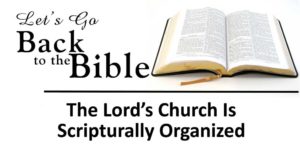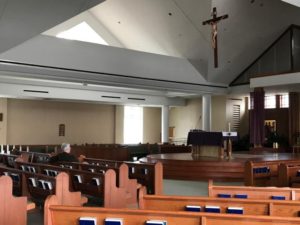
The debate continues whether the individual congregations in any particular geographical area such as a country, region, province, district, zone, or community can come together to carry out common/joint programs in furtherance of a common objective of Christ and His church. This issue has led to different thoughts and positions which appear to be dividing the front of the Lord’s family.
It is therefore imperative for us as disciples of Christ to go back to the New Testament if we can find some clues or evidence of the early individual churches uniting and or working together among themselves in pursuing joint programs and activities to fulfill the mission of Christ as one body. We also need to be clear whether individual local churches’ administrative autonomy will be usurped if different congregations pull resources to carry out or support a common goal jointly as a single group or body of Christ.
Then the question of whether Jesus’ prayer for the perfect unity among all His believers and the teachings of the apostles that Christians are really children of God from the same family with sincere hearts and pure love for one another, promoting peace and unity among people, are true in the current expression of congregational autonomy concept?
- THE BIBLICAL STRUCTURE OF THE CHURCH
- We will all consent to the fact that it is very essential for every human institution to have a system of government to oversee and implement its chosen policies, programs, and operations in order to function successfully. The church we read about in the Bible also has a system of governance.
- The New Testament church is not without a structure, but it is also not a democracy. The church is portrayed as a theocracy. It is a divine monarchy with Jesus Christ as the head or king in heaven and on earth. The Bible teaches in Ephesians 1:22-23, that God “gave him to be the head over all things to the church. Which is his body, the fullness of Him that fills all in all”? He is the one and only lawgiver according to James 4:12. In Christ, the legislative, executive, and judicial powers meet and merge. He possesses all authority as we learn from Matthew 28:18. He has therefore made the laws for his church once and for all (Jude 3; Heb.1:1-3; II Tim.3:16-17). He executes the laws and he will one day judge all according to his system of Biblical truth.
- Therefore, over the church universal, there is no functioning government or central administrative body of individuals or groups that exercise any administrative authority, powers, or control. Thus there is no central earthly headquarters of the church of Christ since the residence (or the Quarters of the head) of the church – Christ – is in heaven (Eph. 1:20; Col. 3:1).
- However, the New Testament emphasizes the prominence of the church in local settings such as the church at Antioch, at Ephesus or at Corinth. Believers in any given community or geographical area called by God congregate together as a unit of the same body/church/family of God in their community with the same faith, teachings, and brotherliness (I Cor. 1:9-10; Phil. 2:2).
- Any unit or congregation which did not subscribe to these united principles of the local church should be considered not part of the body of Christ (I John 2:19; II John 1:9-10; Titus 3:10). These individual units of Christ’s body/church still come together to constitute a united body or Church of Christ (I Cor. 12:12-13).
- WHAT IS AUTONOMY?
- From the Vocabulary.Com Dictionary, Autonomycomes from the Greek roots auto meaning “self” and nomos meaning “custom” or “law.” This reflects the political sense of the word, i.e. a group’s right to self-government or self-rule. The word in the English Dictionary means having “the power or right of self-government”, “political independence”, “immunity from arbitration”, “personal independence” . It also means “undertaken or carried on without outside control” (Merriam-Webster Dictionary). Thus when a group wants to govern itself or a person wants to make independent decisions, they are looking for autonomy. Autonomy therefore in its strictest meaning grants criminal law-safety (i.e. immunity from arbitrary exercise or safety from criminal prosecution or political independence) from any other authority; freedom from control or influence of another or others. (https://www.vocabulary.com/dictionary/)
- From the above definitions, applying AUTONOMY in the strictest sense of the word in the interrelationships of God’s household with Christ as the highest authority may not be completely compatible or appropriate. Honestly speaking, even the apostles did not teach nor practice that Christians are completely autonomous individual members of the local congregations neither did they teach that all individual congregations are autonomous separatist groups of the same body of Christ. What the New Testament highlights and repeatedly emphasizes is the unity of the brotherhood (either as members or congregations) in the bond of peace in fulfilling the dreams of our Lord Jesus Christ (John 17:20-23; Eph. 4:3-4).
- WHAT IS CHURCH AUTONOMY IN THE NEW TESTAMENT?
- For all intents and purposes, Christ built only one church which is also referred to as His body (Matt. 16:18; Eph. 4:4; Col. 1:18; Acts 9:31). The individual units (congregations) of Christ’s body, the church of the New Testament, does not work under any formal centralized administrative control or government, not even under the apostles.
- However, each individual congregation or unit of Christ’s body was identified to have its own local administrative authority/body in the form of elders/overseers, for scripturally matured churches (Acts 14:23; Titus 1:5), and other younger churches were led by preachers and teachers as a team of local church leaders (Acts 13:1; Titus 1:5; 3:12-13).
- These were locally chosen/appointed from among the spiritually and physically matured members of the local church to manage and administer the day-to-day affairs of the local church. They, therefore, formulate and execute programs and activities in pursuit and achievement of the mission of Christ and His Church at both local and global perspectives in collaboration with other brethren of Christ’s body elsewhere (Acts 15:2-4,21-22; 16:4; Gal. 2:9-10; I Cor. 16:1-2).
- The local leadership also ensures the maintenance and development of the local churches on matters concerning the spiritual and physical welfare of the local congregation as a unit, and its individual members in accordance with the teachings of the New Testament, and the local circumstances of each congregation without any direct influence or instructions from another congregation or anybody outside the local church. Since the local leadership is better disposed to the local needs and circumstances of the local churches, they are made to take full charge of these local units of Christ’s body on behalf of Christ who is the head of the global church.
- This makes the leadership of the local churches the highest authority on all matters of expediencies in church governance except on matters that are already taught in the Bible which they cannot decide otherwise. On all matters that can significantly affect other sister congregations in a geographical area, the churches frequently communicate with one another and cooperate to achieve the most beneficial outcome for the church in furtherance of the kingdom of God.
- The local leaders, therefore, maintain their own administrative authority to decide and direct the affairs of the local churches based on what is appropriate in their own circumstances, and in the best interest of the body of Christ which is the Church of Christ worldwide. This concept of the local right and freedom exercised by the local leadership of the New Testament church, in consultation with the entire congregation as much as possible (Acts 1:15-26; 6:2-3), has been referred to as congregational autonomy of the local churches. It is very important to state quickly that congregational autonomy is only a concept but not expressly taught doctrine in the New Testament which anyone can quote directly from the Bible.
- While each of the congregations is seen to be autonomous in managing their local affairs and deciding on all matters of local expediency, there are enough pieces of evidence in the Bible that show that there is a strong tie that binds them all congregations into a highly interconnected body of Christ, the same church and the one family of God (I Cor. 12:12-13; Acts 9:31). The churches in the Bible, therefore, see themselves as one body, the same family, kingdom or household of God (I Tim. 3:15; Eph. 2:19; Gal. 3:26-28). There is, therefore, a strong sense of spiritual and social linkages among all the congregations of the Lord’s church in promoting the cause of Christ, and to help and build one another irrespective of their individual geographical locations (Rom. 15:26; II Cor. 11:9; I Cor. 16:1-2).
- BENEFITS OF THE CONGREGATIONAL AUTONOMY
- There is great wisdom in the plan of God for the governance of His church to be under the local leadership but not by any human authority outside the local congregation. Among other things, this system of church governance shows that if one congregation departs from the truth, or drifts away from what is expressly taught in the Bible and follow any different doctrine (I Tim. 4:1-3; Col. 2:8; II John 1:9-10), its nearest sister churches need not be deviated or forced to follow (II John 9-10; Col. 2:8; Rom.16:17; Rev.3:11). When one local congregation becomes wayward as the church in Pergamum did or become lukewarm as the church at Laodicea did in Revelation chapters 2 and 3, their influence would not be automatically transferred to infect other congregations under their jurisdiction to also forsake the truth and become wayward.
- God’s plan for the organization of the church is also intended to prevent selfish and or ungodly groups of believers or individual leaders from taking the church as their personal properties, lording it over the congregation as some apostate or one-man churches do. The plurality of the local church leadership system also seeks to avoid individuals from misappropriating the assets/resources of the church for themselves and their families. But to have effective and efficient management and administrative systems that evolve from the counsel of spiritually and mentally matured elders appointed by and from among the local congregation.
- For this reason, all individual congregations must seek to grow to appoint godly ordained elders to oversee the flock of God in their locality (Acts 14:23; 20:28; Titus 1:5). The hallmark of a good and effective preacher and his team of leaders is best demonstrated in his ability to establish and or grow a congregation to develop their own spiritually matured and ordained eldership. The elders are charged in the New Testament not only to oversee and feed the congregations with the spiritual meals but also to effectively prevent and protect them from false teachers who cause divisions in the body of Christ. “He must hold firmly to the trustworthy message as it has been taught so that he can encourage others by sound doctrine and refute those who oppose it … They must be silenced because they are ruining whole households by teaching things they ought not to teach– and that for the sake of dishonest gain” (Tit.2:9-11).
- The leadership of the Lord’s church, therefore, needs to be watchful from both within and without themselves. Paul warned the elders of the church at Ephesus that “Even from your own number men will arise and distort the truth in order to draw away disciples after them. So be on your guard! Remember that for three years I never stopped warning each of you night and day with tears” (Acts 20:30-31).
- THE CHURCHES OF CHRIST IN THE BIBLE WERE UNITED
- It is the basic teaching of scriptures that Christ did not establish many “churches” but one church which He refers to as His body (Matt. 16:18; Eph. 4:4; Col. 1:18).
- Jesus Christ is the Head of the church and there is no earthly headquarters or human head – by individual or group of persons – (Eph. 1:22-23)
- The New Testament speaks of the universal church in the same way it refers to a church in a local setting such as the church in Jerusalem, at Antioch, at Ephesus or at Corinth (Acts 9:31; Gal. 1:13)
- Each congregation was lead and ruled by its own chosen leaders as eldership (Acts 14:23; 20:17,28; Titus 1:5; I Tim. 5:17; I Pet. 5:1-3)
- The local churches, however, related to each other as members of the same family (1 Cor. 12:13; Gal. 3:6-9)
- Just as the universal church was viewed and addressed as the local congregation, the cluster of congregations in a given geographical area (like a province, district, or zone) worked together as a local congregation whenever they deemed it necessary (II Cor. 8:1-5,16-23; 1:1; 9:2; 11:9-10; Rom. 15:26; Col 4:12-13).
- Though each of the congregations in Macedonian and Achaean provinces/regions was autonomous yet they were all together and saw themselves as part of the one and the same body of Christ in their respective regions (Phil. 1:1; Col. 4:15-16)
- They saw themselves as one body but not separatist individual entities (Eph. 4:4; I Cor. 1:10-13)
- The early congregations cooperated with each other as one church in the performance of NEEDED works, programs, or projects as members of the same family and brethren (Rom. 15:26; II Cor. 8:1-3)
- However, each congregation still maintained its own autonomy in governance and administration (Rev. 1:11).
- It would therefore be wrong to interpret the autonomy of every local congregation to mean that every local church forms one body of Christ separate from the others and should work and live separately and independent of each other.
- Just as individual local churches sometimes have zonal groupings that meet at various suburbs of the same community of that congregation, so we have several congregations or local churches as zonal groups, all forming part of the one and the same Church of Christ in a given district, region, country, and the world. (Acts 2:47; 9:31; 2:17-19, I Cor. 12:12)
- SIGNIFICANCE OF THE UNITY OF THE CHURCH
- The unity of the church is a fundamental principle of Christianity and anyone who seeks to downplay this unity under the guise of separatist church autonomy should be marked out (Rom. 16:17-18; Acts 20:30-31; Tit. 3:10).
- Jesus earnestly prayed for a complete unity of His church which was about to be established (John 17:20-21, 23).
- The Holy Spirit also through the Apostle Paul admonished Christians against any attempt to cause disunity among the body of Christ, the children of God (I Cor. 1:10-13; Eph. 4:3-6).
- The world will believe in our Lord Jesus Christ if Christian can demonstrate exemplary godly unity in everything they do (John 17:21; 13:35)
- The United Christian Church will frustrate the devil and any detractors from sneaking into the brotherhood to cause trouble for the souls Christ has called (I Cor. 1:10-13)
- With unity, the church can easily overtake the world for Christ (Gen. 11:6; John 17:21; Eph. 4:1-4)
- INTER-CHURCH COOPERATION IS BIBLICAL
The word cooperation is defined by the American Heritage Dictionary, 2000 as, “To work or act together toward a common end or purpose. To form an association for common, usually economic benefits.” – American Heritage Dictionary, 2000.
- There are several instances where the Bible speaks about the mutual acts of brotherliness and church cooperation of local congregations because they are all one body of Christ.
- When the churches in the Gentile lands learned of the economic hardships among the churches in Judea (Acts 11:27-30; II Cor. 8:1-5, 8; Rom. 15:16).
- Churches in a whole province appointed a single brother to represent all the churches in Macedonian because they were all one and the same church (II Cor. 8:18-19)
- When a local congregation was faced with a difficult doctrine they contacted a sister church (Acts 15:1-24).
- When the Corinthian church could not deal with the sexual immorality and marriage issues (I Cor. 5:1-2; 7:1).
- When there were misunderstanding and confusion in the churches in the Gentile lands, (Acts 15:19-20, 23).
- We should not lose sight of the important role of the elders in the church in Jerusalem (Acts 15:2, 4, 6, 22-23).
- Note the important role of James who was only an elder but not an apostle (like Peter and Paul) in the church at Jerusalem (Gal. 2:9-10; Acts 15:13, 19-20).
- When the churches in the apostolic time learned of the establishment of new congregations, (Acts 8:14; 11:20-22, 14:21-23; 15:36)
- Why do certain people want to take the Lord’s church as separatist organizations by seeking to misinterpret congregational autonomy? (III John 9-10; Gal. 2:4-5; Phil. 1:15-16; 3:18-19).
- EXAMPLES OF TERRITORIAL/AREA CHURCHES IN THE NEW TESTAMENT
- Churches of Christ in Judea (Gal.1:22; I Thess. 2:14);
- Church in Babylon (I Peter 5:13)
- Churches of Christ in Galatia (Gal. 1:2; I Cor. 16:1)
- Brethren in Italy (Heb. 13:24)
- Churches of Christ in Achaia (Rom. 15:26)
- Churches of Christ in the Province of Asia (I Cor. 16:19; Rev. 1:4)
- Churches of Christ in Macedonia (II Cor. 8:1; 11:9; Rom. 15:26).
All these biblical names mentioned above referred to groups of individual congregations with their separate local leaders. They however saw and worked together as one body of Christ (one church) within the same province, region, or country. The nomenclature (or common name) used to refer to or call these groups of local churches who were located in the same province/jurisdiction (the same geographical areas) are not different from “Churches of Christ in Ghana” which is the same as “Church of Christ, Ghana” (Gal. 1:2; II Cor. 8:1; Gal. 1:22)
- ABUSE OF CHURCH AUTONOMY
- Some individuals have misconstrued the concept of church autonomy to mean separatist or non-alliance independent individual congregation which should not do anything together as one group contrary to the teachings of the New Testament (John 17:21-23; Eph. 4:3-4; I Cor. 12:12; I Cor. 1:10-13; Phil. 2:2).
- The crusaders of separatist autonomous congregations, therefore, misapply the concept (sometimes in their interest) to destroy the unity and brotherliness of Christ’s church as well as the truth they claim to be protecting (II Pet. 2:1-2; Acts 20:30-31; III John 1:9-10; Titus 3:10)
- There have been series of police cases, court suits, and public assaults/abuse of brethren during and after church services, on radio, television, and other social media by some of the brethren who have misinterpreted and crusading the local church autonomy to the disgrace and disintegration of the Lord’s church in several areas.
- Unfortunately, evidence abounds that most of the elders, preachers, church leaders, and teachers who have been so emotional and desperately crusading to divide the united front of the one body of Christ on the basis of their doctrine of independent separatist autonomous churches, have been misappropriating resources meant for the local churches as their personal properties.
- The warning to the Christian from the Bible is to be watchful, and mark such people since they usually have their selfish agenda by carrying the banners like, “Every Church is Autonomous”, “We Cannot Combine to Do Anything Together”, “Any Joint Service, Venture or Program by Individual Congregations is Sin” (Acts 20:30-31; Rom. 16:17-18; Phil. 1:15,17; 3:18-19; Gal. 2:4-5)
By Emmanuel Antwi ( The Principal, Ghana Bible College, Kumasi)
Email Address: ekboasiakoh@yahoo.co.uk




